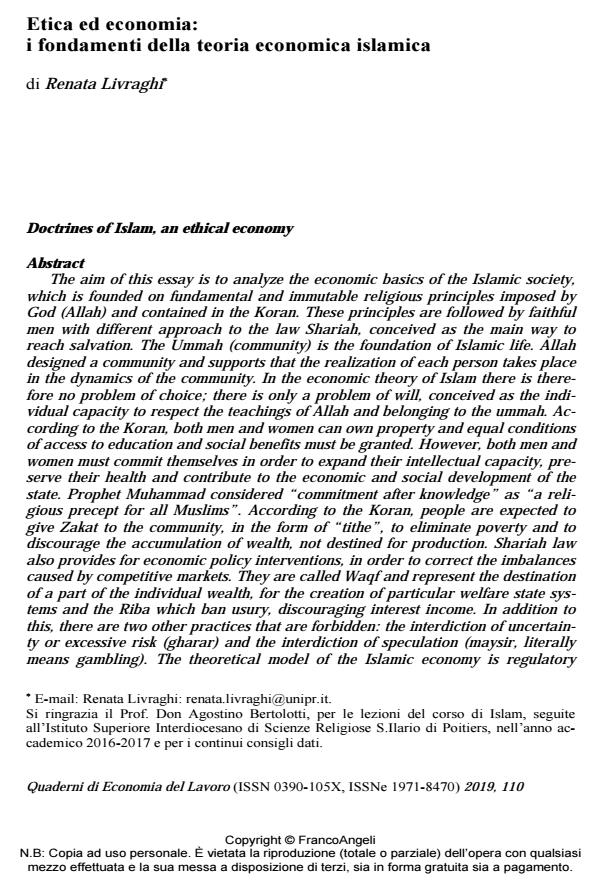Etica ed economia: i fondamenti della teoria economica islamica
Titolo Rivista QUADERNI DI ECONOMIA DEL LAVORO
Autori/Curatori Renata Livraghi
Anno di pubblicazione 2020 Fascicolo 2019/110
Lingua Italiano Numero pagine 23 P. 159-181 Dimensione file 283 KB
DOI 10.3280/QUA2019-110008
Il DOI è il codice a barre della proprietà intellettuale: per saperne di più
clicca qui
Qui sotto puoi vedere in anteprima la prima pagina di questo articolo.
Se questo articolo ti interessa, lo puoi acquistare (e scaricare in formato pdf) seguendo le facili indicazioni per acquistare il download credit. Acquista Download Credits per scaricare questo Articolo in formato PDF

FrancoAngeli è membro della Publishers International Linking Association, Inc (PILA)associazione indipendente e non profit per facilitare (attraverso i servizi tecnologici implementati da CrossRef.org) l’accesso degli studiosi ai contenuti digitali nelle pubblicazioni professionali e scientifiche
Lo scopo di questo saggio è quello di evidenziare i principi economici dell’economia islamica che è fondata su principi religiosi fondamentali e immutabili, imposti da Dio (Allah), contenuti nel Corano e realizzati dagli uomini credenti, con modalità diverse di interpretazioni, dalla legge Shariah, intesa come "la via maestra per giungere alla salvezza". La ummah (comunità) è il fondamento della fede islamica. Allah ha progettato una comunità e sostiene che la realizzazione di ciascuna persona avviene nella dinamica della comunità. Nella teoria economica dell’Islam non vi è quindi un problema di scelta; vi è solo un problema di volontà, intesa come capacità di adeguamento della persona agli insegnamenti di Allah e di appartenenza all’ummah. Nel Corano, si legge che sia gli uomini, sia le donne pos-sono detenere proprietà e vanno concesse pari condizioni di accesso all’istruzione e ai benefici sociali. Ambedue i sessi devono però impegnarsi, per ampliare la pro-pria capacità intellettuale, preservare la propria salute e contribuire allo sviluppo economico e sociale dello stato. Il Profeta Muhammad considerava «l’impegno dopo la conoscenza» come «un precetto religioso per tutti i musulmani». Nel Co-rano si prevede che le persone diano la Zakat alla comunità, sotto forma di "decima", per eliminare la povertà e per disincentivare l’accumulazione della ricchezza, non destinata alla produzione. La legge della Shariah prevede poi interventi di po-litica economica che servono a correggere gli squilibri determinati dai mercati con-correnziali. Essi sono la Waqf che è la destinazione di una parte della ricchezza in-dividuale, per la creazione di sistemi particolari di welfare state e la Riba che vieta l’usura e cerca di disincentivare i redditi da interesse. Vi sono altre due pratiche che sono vietate: il divieto dell’incertezza o rischio eccessivo (gharar) e divieto della speculazione (maysir, letteralmente significa gioco d’azzardo). Il modello teorico, dell’economia islamica, è di natura normativa, pur privilegiando l’azione dei mer-cati concorrenziali. Gli individui appartengono a una comunità il cui compito è quello di contenere le diseguaglianze del reddito e di operare per la crescita dello sviluppo umano.
Parole chiave:Dottrine religiose, scelte collettive, benessere, comunità
- Ayub M. (2007). Understanding Islamic Finance. Chichester: John Wiley & Sons Ltd.
- Askari H., Taghavi R. (2005). I fondamenti di principio di un’economia islamica. Moneta e Credito, LVIII(232): 175-194.
- Castro F. (1990). Diritto Musulmano. In: Digesto delle discipline privatistiche: sezione civile, vol. VI, pp. 284-314. Torino: UTET.
- Francesca E. (2013). Economia, religione e morale nell’islam. Roma: Carocci editore.
- Hamza Piccardo R., a cura di e trad. it. (2016). Il Corano. Edizione integrale. Roma: Newton Compton Editori, quattordicesima edizione.
- Nardi F. (2011). La teoria dell’interesse tra etica ed economia: spunti dal pensiero medioevale. -- Testo disponibile al sito: https://www.academia.edu/3080967/La_teoria_dellinteresse_tra_etica_ed_economia_spunti_dal_pensiero_medioevale.
- Qutb S. (1996). In: Pacini A., a cura di, I Fratelli Musulmani e il dibattito sull’islam politico. Torino: Fondazione Giovanni Agnelli.
- Romanelli M.M. (2002). Il fenomeno religioso. Manuale di sociologia della religione. Bologna: Edizioni Dehoninane.
- Schacht J. (1995). Introduzione al diritto musulmano. Torino: Fondazione Giovanni Agnelli.
- Shirazi I.M. (2001). War, Peace and Non-Violence: An Islamic Perspective. London: Funtainbooks.
- Ul Haq (1995). Economic Doctrines of Islam. Islamabad: The International Institute of Islamic Thought.
- UNDP (1990). Human Development Report 1990. Oxford: Oxford University Press.
- Veca S. (2009) Dizionario minimo. -- Testo disponibile al sito: http://www.libertaegiustizia.it/upload/Dizionario_Minimo.pdf.
- Virgili T. (2016). Libertà e democrazia nell’Islam: un nodo di Gordio? federalismi.it, 2: 2-33.
Renata Livraghi, Etica ed economia: i fondamenti della teoria economica islamica in "QUADERNI DI ECONOMIA DEL LAVORO" 110/2019, pp 159-181, DOI: 10.3280/QUA2019-110008